【课堂练习】Unit 12 Life is full of the unexpected Period 2 同步习题课件
文档属性
| 名称 | 【课堂练习】Unit 12 Life is full of the unexpected Period 2 同步习题课件 | 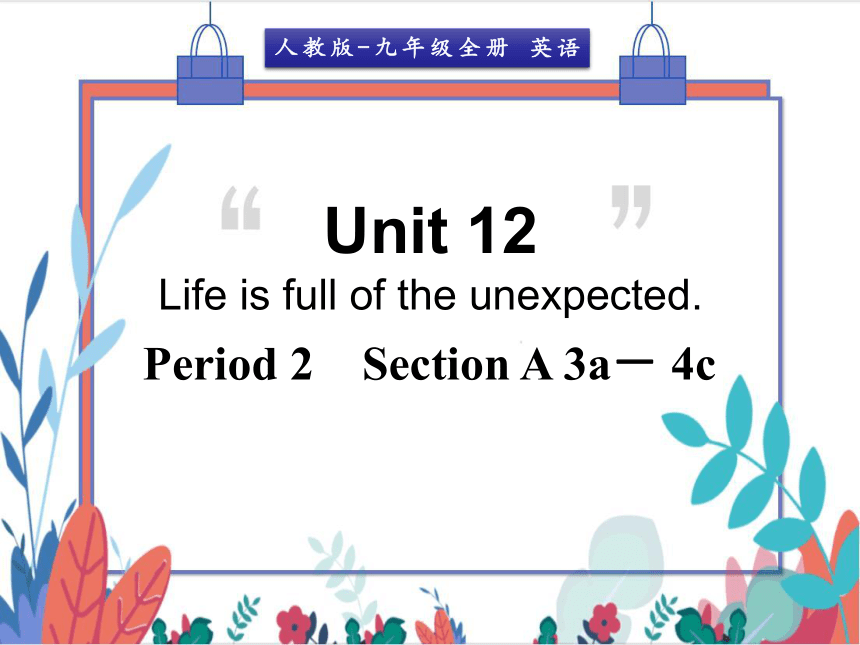 | |
| 格式 | pptx | ||
| 文件大小 | 526.0KB | ||
| 资源类型 | 试卷 | ||
| 版本资源 | 人教新目标(Go for it)版 | ||
| 科目 | 英语 | ||
| 更新时间 | 2022-02-15 15:06:35 | ||
图片预览

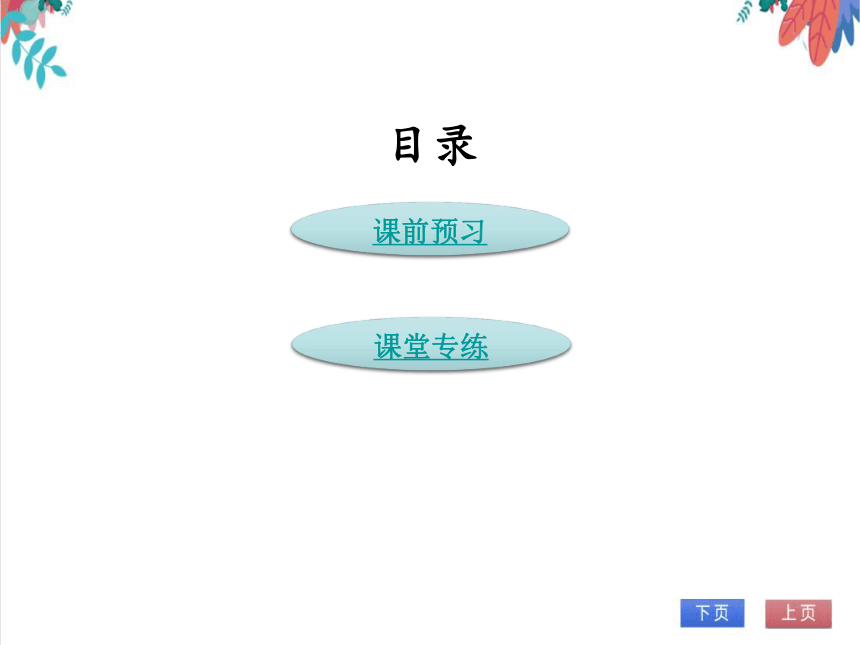
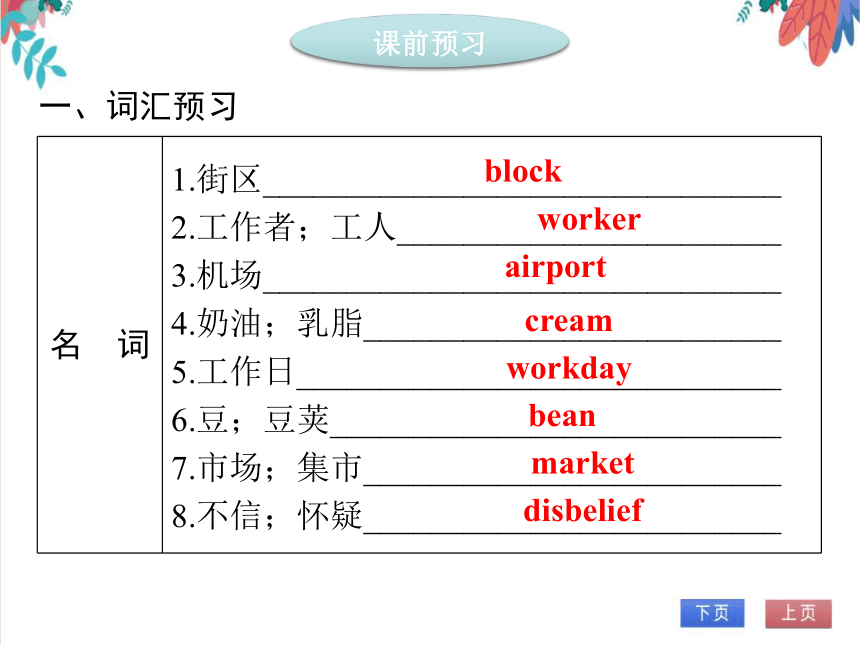
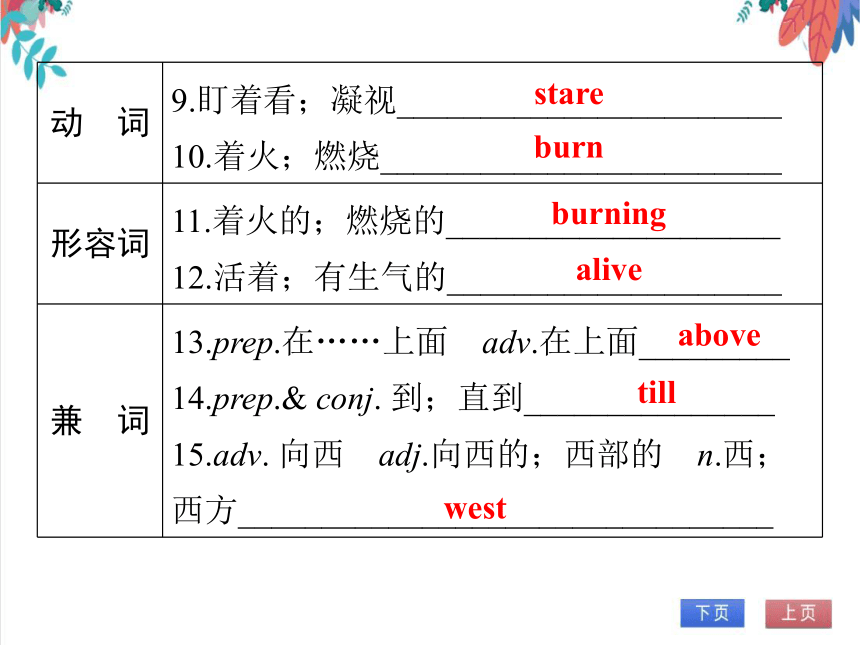
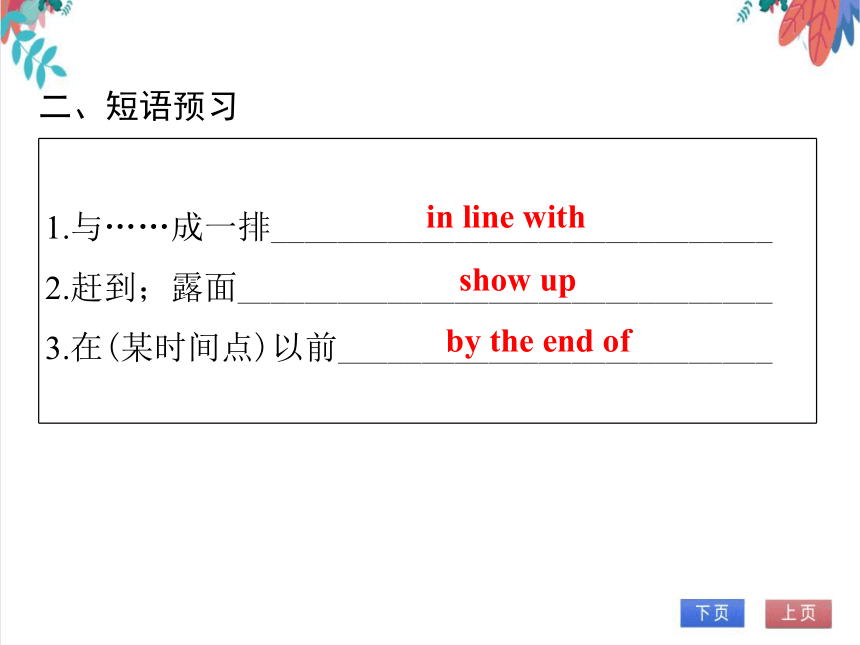
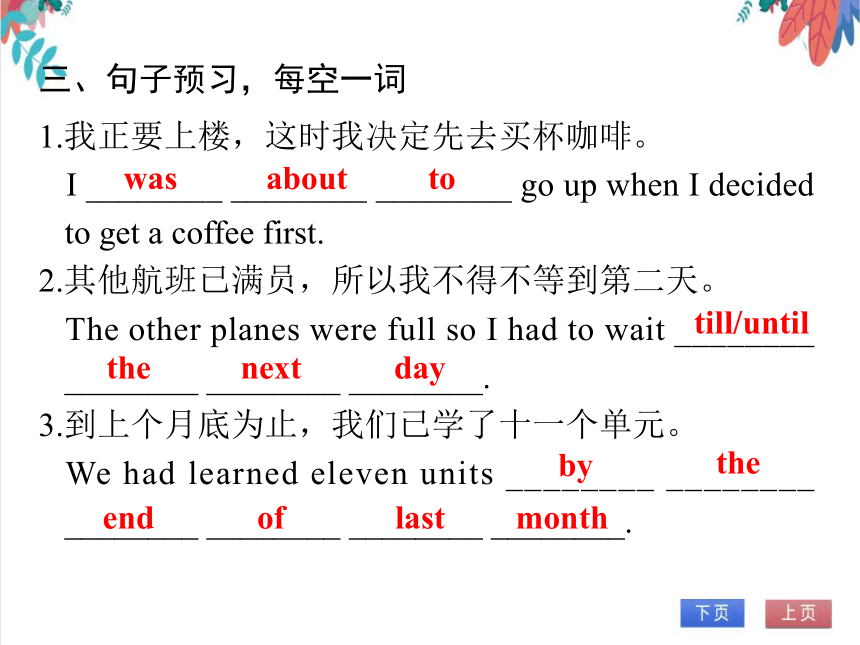
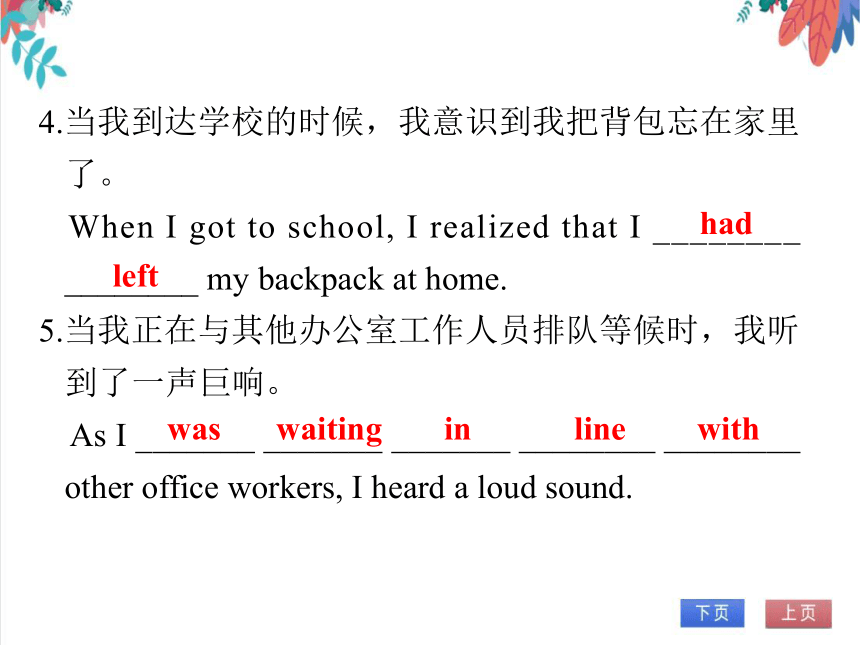
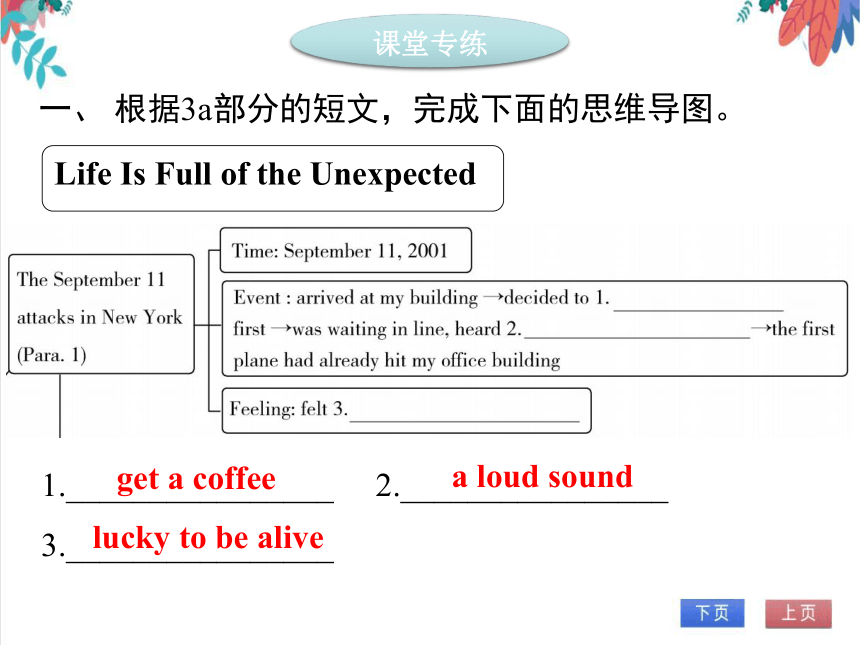
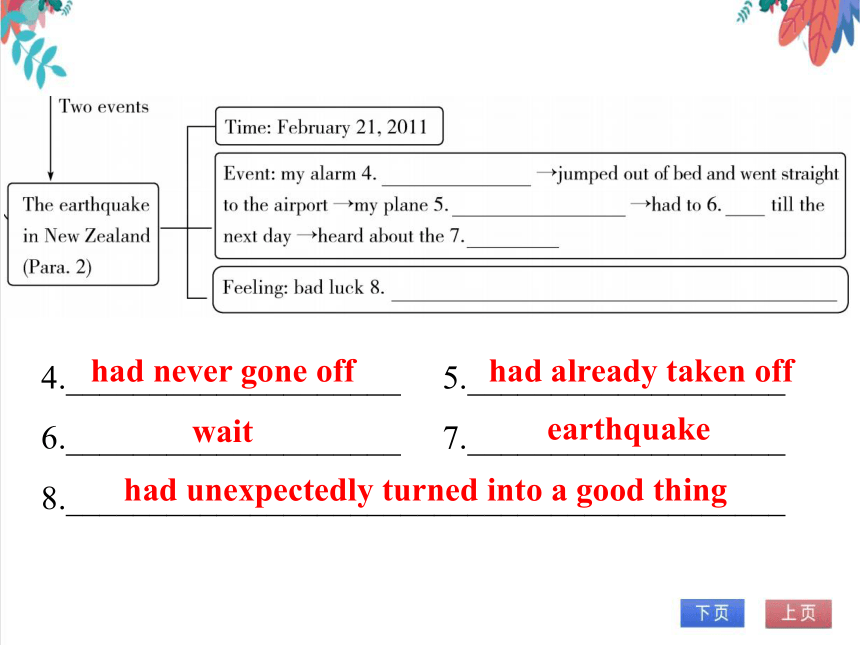
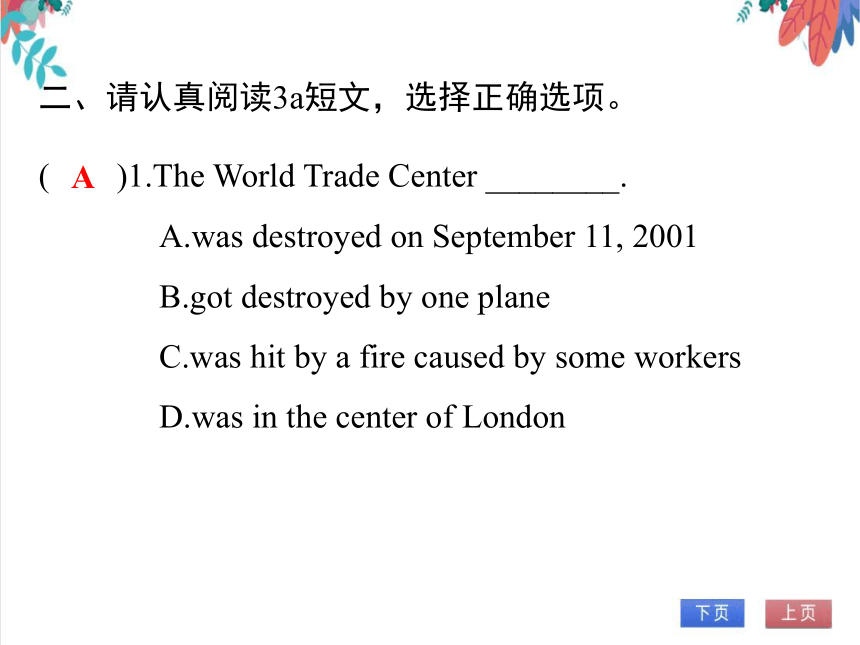
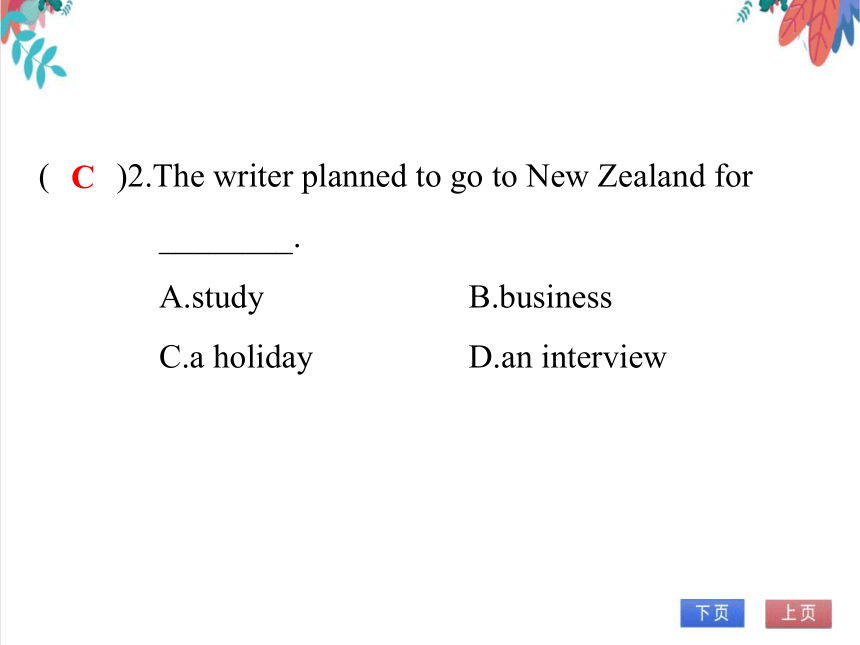
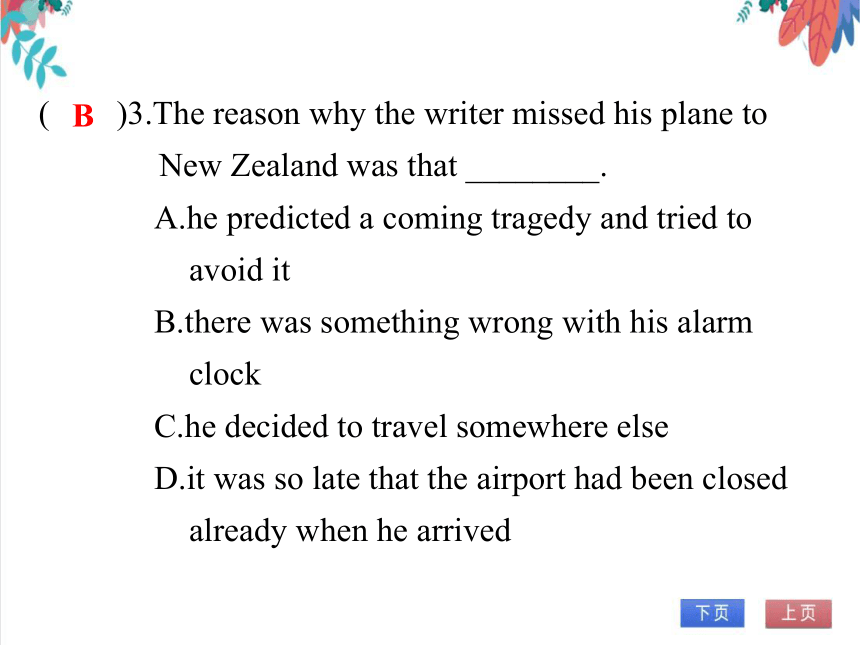
文档简介
(共37张PPT)
人教版-九年级全册 英语
Period 2 Section A 3a- 4c
Unit 12
Life is full of the unexpected.
目录
课前预习
课堂专练
课前预习
一、词汇预习
名 词 1.街区_______________________________
2.工作者;工人_______________________
3.机场_______________________________
4.奶油;乳脂_________________________
5.工作日_____________________________
6.豆;豆荚___________________________
7.市场;集市_________________________
8.不信;怀疑_________________________
block
worker
airport
cream
workday
bean
market
disbelief
动 词 9.盯着看;凝视_______________________
10.着火;燃烧________________________
形容词 11.着火的;燃烧的____________________
12.活着;有生气的____________________
兼 词 13.prep.在……上面 adv.在上面_________
14.prep.& conj. 到;直到_______________
15.adv. 向西 adj.向西的;西部的 n.西;西方________________________________
stare
burn
burning
alive
above
till
west
二、短语预习
1.与……成一排______________________________
2.赶到;露面________________________________
3.在(某时间点)以前__________________________
in line with
show up
by the end of
三、句子预习,每空一词
1.我正要上楼,这时我决定先去买杯咖啡。
I ________ ________ ________ go up when I decided to get a coffee first.
2.其他航班已满员,所以我不得不等到第二天。
The other planes were full so I had to wait ________ ________ ________ ________.
3.到上个月底为止,我们已学了十一个单元。
We had learned eleven units ________ ________ ________ ________ ________ ________.
was
about
to
till/until
the
next
day
by
the
end
of
last
month
4.当我到达学校的时候,我意识到我把背包忘在家里了。
When I got to school, I realized that I ________ ________ my backpack at home.
5.当我正在与其他办公室工作人员排队等候时,我听到了一声巨响。
As I _______ _______ _______ ________ ________ other office workers, I heard a loud sound.
had
left
was
waiting
in
line
with
课堂专练
一、 根据3a部分的短文,完成下面的思维导图。
1.________________ 2.________________
3.________________
get a coffee
Life Is Full of the Unexpected
a loud sound
lucky to be alive
4.____________________ 5.___________________
6.____________________ 7.___________________
8.___________________________________________
had never gone off
had already taken off
wait
earthquake
had unexpectedly turned into a good thing
二、请认真阅读3a短文,选择正确选项。
( )1.The World Trade Center ________.
A.was destroyed on September 11, 2001
B.got destroyed by one plane
C.was hit by a fire caused by some workers
D.was in the center of London
A
( )2.The writer planned to go to New Zealand for ________.
A.study B.business
C.a holiday D.an interview
C
( )3.The reason why the writer missed his plane to New Zealand was that ________.
A.he predicted a coming tragedy and tried to avoid it
B.there was something wrong with his alarm clock
C.he decided to travel somewhere else
D.it was so late that the airport had been closed already when he arrived
B
( )4.According to the passage, which of the following is NOT true
A.The writer missed the two events by accident.
B.An earthquake happened in New Zealand on February 21, 2011.
C.The writer felt lucky about missing the plane to New Zealand when he heard the news the next morning.
D.The writer used to work as a waiter in a coffee house.
D
( )5.The passage mainly describes ________.
A.the writer's two unexpected experiences
B.why the two tragedies happened and how to avoid them
C.how terrible the writer felt about almost being killed twice
D.two horrible events which took place in the US and New Zealand
A
三、 考点探究
I was about to go up when I decided to get a coffee first.
我正要上楼,这时我决定先去买杯咖啡。
be about to do sth.意为“_____________”,表将来。这一结构表示马上就要发生,一般不与具体的时间状语连用。本句中的when表示“________”,用于描述一个几乎同时发生的动作。
例:Be quiet.The film is about to start.
安静。电影马上开始。
正要做某事
这时
用适当的单词填空
They were about to leave ________ it began to rain.
when
The other planes were full so I had to wait till the next day.
其他航班已满员,所以我不得不等到第二天。
till此处用作_______,意为“到;直到”,与________同义。还可用作________,连接时间状语从句。
①till/until用于肯定句中,主句动词常为__________,表示这个动作一直延续到till/until所表示的时间为止。
例:He will wait for you until you come.
他会等着你直到你来。
介词
until
连词
延续性动词
②till/until用于否定句中,构成not… till/until… 结构,表示“______________”,主句动词常用________,表示till/until所表示的时间一到,该动作就发生。
例:They didn't start the dinner until Jack came.
他们等杰克来了才开始吃晚饭。
直到……才……
瞬间动词
用适当的词填空
1.Until she spoke I ________ realized she wasn't English.
2.When I was a little boy, Mom used to sit by my bed, telling stories ________ I fell asleep.
hadn't
till/until
by the end of the school day 一天的学校生活结束时
【辨析】by the end of, at the end of与in the end
by theend of “在(某时间点)以前;到……为止”,仅指时间,指某一动作在某时间点以前或到某一时间段为止就已发生或完成,多用于过去完成时或表示将来的时态中。 We had learned eleven units by the end of last month.
到上个月底为止,我们已学了十一个单元。
He will come by the end of the month.
他将在月底来。
at theend of “在……尽头(末端)”,后面可接地点或时间名词,通常与一般过去时或一般将来时连用。 You will find the hospital at the end of the road.
在路的尽头,你就会找到那家医院。
He came back at the end of March.
他是三月底回来的。
in the end “最后,最终”,与at last/finally同义。 He succeeded in the end.
他最后成功了。
用适当的介词填空
1.________ the end, he finds his cat ________ the end of the road.
2.I had written ten letters to my pen pal ________ the end of last week.
3.My sister will come back home ________ the end of July.
In
at
by
by/at
四、 根据3a部分的短文,完成下面的语法选择。
In May 2001, I found a job in New York at the World Trade Center.On September 11, 2001, I arrived at my building at around 8:30 a.m.I was about to go up __1__ I decided to get a coffee first.I went to my favorite coffee place even though it was two blocks east from my office.As I was waiting __2__ line with other
( )1.A.before B.as C.when D.after
( )2.A.in B.on C.out D.off
C
A
office workers, I heard a loud sound.Before I could join the others outside to see __3__ was going on, the first plane had already hit my office building.We stared in disbelief at the black smoke rising above the __4__ building.I felt lucky to be alive.
( )3.A.how B.why C.when D.what
( )4.A.burned B.burn C.burning D.to burn
D
C
Almost 10 years __5__, I woke up at 10:00 a.m.on February 21, 2011 and realized that my alarm never went off.I jumped out of bed __6__ went straight to the airport.But by the time I got to the airport, my plane to New Zealand __7__ off.“This is the first
( )5.A.late B.later C.latest D.the latest
( )6.A.but B.and C.or D.so
( )7.A.take B.took C.have taken D.had taken
B
B
D
holiday I've taken in a year, and I have missed my plane.__8__ bad luck!” I thought to __9__.The other planes were full so I had to wait till __10__ next day.The next morning, I heard about the earthquake in New Zealand the day before.My bad luck had unexpectedly turned into a good thing.
( )8.A.What B.What a C.How D.How a
( )9.A.myself B.my C.me D.mine
( )10.A.a B.an C.the D./
A
A
C
过去完成时
一、过去完成时的意义
过去完成时表示到过去某时为止或在过去某时或某一动作之前已经发生或完成了的动作,即表示动作发生的时间是“______________”。
二、过去完成时的构成
过去完成时由“____________________________”构成。其各种句式如下:
过去的过去
had(用于各种人称和数)+过去分词
句式 构成 示例
肯定句 主语+ had+过去分词+其他. I had learnt over 1,000 English words by the end of last year.
到去年年底,我已经学了1000多个英语单词。
否定句 主语+had+not+过去分词+其他. When I came back home, he hadn't gotten home yet.我回到家的时候他还没有到家。
句式 构成 示例
一般疑问句 Had+主语+过去分词+其他? Yes,主语+ had. No,主语+ hadn't. —Had she arrived at the village before 8 o'clock last night 昨晚8点之前她到达这个村庄了吗?
—Yes, she had./No, she hadn't.是的,她到了。/不,她没到。
特殊疑问句 疑问词+had+主语+过去分词+其他? —How long had he studied French by the age of 16 到十六岁时,他已经学了多长时间的法语了?
—For three years.三年了。
三、 过去完成时的用法
用法 示例
过去完成时表示过去某一时间之前已经发生或完成了的动作。常用的时间状语有by …, by the time …, by the end of …等。 They had collected over 1,000 stamps by the end of last month.
到上个月底,他们已收集了1000多张邮票。
用法 示例
过去完成时用在said, told, knew, heard, realized等后的宾语从句中。 She said (that) she had never been to Paris.她说她从没有去过巴黎。
过去完成时出现在含when, after, before等引导的状语从句的复合句中。 Before you arrived, I had already arrived.你到达之前我已经到了。
一、 语法选择
I had an amusing experience last year.After I__1__ a small village in the south of France, I drove on to the next town.On the way, a young man __2__ to me.
( )1.A.leave B.have left
C.had left D.will leave
( )2.A.waves B.waved
C.had waved D.has waved
C
B
I stopped and he asked me for a lift.As soon as he __3__ into the car, I said good morning to him in French and he replied in the same language.Apart from
( )3.A.gets B.was getting
C.will get D.had got
D
a few words, I did not know any French at all.Neither of us __4__ during the journey.I __5__ the town, when the young man suddenly said, very slowly, “Do you speak English?” As I soon learnt, he was English himself!
( )4.A.spoke B.were speaking
C.had spoken D.have spoken
( )5.A.had reached nearly B.had nearly reached
C.have reached nearly D.have nearly reached
A
B
二、 短文填空
My old friend, Harrison, had lived in the Mediterranean for many years __1__ he returned to England.He __2__ often dreamed of retiring in England and had planned to settle down in the country.As soon as he had returned, he bought a fine house and went to live there.Almost immediately he began to complain about the __3__, for even though it was still summer, it rained continually and it was often cold.After so many years of
sunshine, Harrison got a shock.He acted as if he had never lived in England before.In the end, it was __4__ than he could bear.He had hardly had time to settle down when he sold the house and left the country.The dream he had had for so many years ended there.Harrison had thought of everything __5__ the weather.
1.__________ 2.__________ 3.__________ 4.__________ 5.__________
before
had
weather
more
except/but
人教版-九年级全册 英语
Period 2 Section A 3a- 4c
Unit 12
Life is full of the unexpected.
目录
课前预习
课堂专练
课前预习
一、词汇预习
名 词 1.街区_______________________________
2.工作者;工人_______________________
3.机场_______________________________
4.奶油;乳脂_________________________
5.工作日_____________________________
6.豆;豆荚___________________________
7.市场;集市_________________________
8.不信;怀疑_________________________
block
worker
airport
cream
workday
bean
market
disbelief
动 词 9.盯着看;凝视_______________________
10.着火;燃烧________________________
形容词 11.着火的;燃烧的____________________
12.活着;有生气的____________________
兼 词 13.prep.在……上面 adv.在上面_________
14.prep.& conj. 到;直到_______________
15.adv. 向西 adj.向西的;西部的 n.西;西方________________________________
stare
burn
burning
alive
above
till
west
二、短语预习
1.与……成一排______________________________
2.赶到;露面________________________________
3.在(某时间点)以前__________________________
in line with
show up
by the end of
三、句子预习,每空一词
1.我正要上楼,这时我决定先去买杯咖啡。
I ________ ________ ________ go up when I decided to get a coffee first.
2.其他航班已满员,所以我不得不等到第二天。
The other planes were full so I had to wait ________ ________ ________ ________.
3.到上个月底为止,我们已学了十一个单元。
We had learned eleven units ________ ________ ________ ________ ________ ________.
was
about
to
till/until
the
next
day
by
the
end
of
last
month
4.当我到达学校的时候,我意识到我把背包忘在家里了。
When I got to school, I realized that I ________ ________ my backpack at home.
5.当我正在与其他办公室工作人员排队等候时,我听到了一声巨响。
As I _______ _______ _______ ________ ________ other office workers, I heard a loud sound.
had
left
was
waiting
in
line
with
课堂专练
一、 根据3a部分的短文,完成下面的思维导图。
1.________________ 2.________________
3.________________
get a coffee
Life Is Full of the Unexpected
a loud sound
lucky to be alive
4.____________________ 5.___________________
6.____________________ 7.___________________
8.___________________________________________
had never gone off
had already taken off
wait
earthquake
had unexpectedly turned into a good thing
二、请认真阅读3a短文,选择正确选项。
( )1.The World Trade Center ________.
A.was destroyed on September 11, 2001
B.got destroyed by one plane
C.was hit by a fire caused by some workers
D.was in the center of London
A
( )2.The writer planned to go to New Zealand for ________.
A.study B.business
C.a holiday D.an interview
C
( )3.The reason why the writer missed his plane to New Zealand was that ________.
A.he predicted a coming tragedy and tried to avoid it
B.there was something wrong with his alarm clock
C.he decided to travel somewhere else
D.it was so late that the airport had been closed already when he arrived
B
( )4.According to the passage, which of the following is NOT true
A.The writer missed the two events by accident.
B.An earthquake happened in New Zealand on February 21, 2011.
C.The writer felt lucky about missing the plane to New Zealand when he heard the news the next morning.
D.The writer used to work as a waiter in a coffee house.
D
( )5.The passage mainly describes ________.
A.the writer's two unexpected experiences
B.why the two tragedies happened and how to avoid them
C.how terrible the writer felt about almost being killed twice
D.two horrible events which took place in the US and New Zealand
A
三、 考点探究
I was about to go up when I decided to get a coffee first.
我正要上楼,这时我决定先去买杯咖啡。
be about to do sth.意为“_____________”,表将来。这一结构表示马上就要发生,一般不与具体的时间状语连用。本句中的when表示“________”,用于描述一个几乎同时发生的动作。
例:Be quiet.The film is about to start.
安静。电影马上开始。
正要做某事
这时
用适当的单词填空
They were about to leave ________ it began to rain.
when
The other planes were full so I had to wait till the next day.
其他航班已满员,所以我不得不等到第二天。
till此处用作_______,意为“到;直到”,与________同义。还可用作________,连接时间状语从句。
①till/until用于肯定句中,主句动词常为__________,表示这个动作一直延续到till/until所表示的时间为止。
例:He will wait for you until you come.
他会等着你直到你来。
介词
until
连词
延续性动词
②till/until用于否定句中,构成not… till/until… 结构,表示“______________”,主句动词常用________,表示till/until所表示的时间一到,该动作就发生。
例:They didn't start the dinner until Jack came.
他们等杰克来了才开始吃晚饭。
直到……才……
瞬间动词
用适当的词填空
1.Until she spoke I ________ realized she wasn't English.
2.When I was a little boy, Mom used to sit by my bed, telling stories ________ I fell asleep.
hadn't
till/until
by the end of the school day 一天的学校生活结束时
【辨析】by the end of, at the end of与in the end
by theend of “在(某时间点)以前;到……为止”,仅指时间,指某一动作在某时间点以前或到某一时间段为止就已发生或完成,多用于过去完成时或表示将来的时态中。 We had learned eleven units by the end of last month.
到上个月底为止,我们已学了十一个单元。
He will come by the end of the month.
他将在月底来。
at theend of “在……尽头(末端)”,后面可接地点或时间名词,通常与一般过去时或一般将来时连用。 You will find the hospital at the end of the road.
在路的尽头,你就会找到那家医院。
He came back at the end of March.
他是三月底回来的。
in the end “最后,最终”,与at last/finally同义。 He succeeded in the end.
他最后成功了。
用适当的介词填空
1.________ the end, he finds his cat ________ the end of the road.
2.I had written ten letters to my pen pal ________ the end of last week.
3.My sister will come back home ________ the end of July.
In
at
by
by/at
四、 根据3a部分的短文,完成下面的语法选择。
In May 2001, I found a job in New York at the World Trade Center.On September 11, 2001, I arrived at my building at around 8:30 a.m.I was about to go up __1__ I decided to get a coffee first.I went to my favorite coffee place even though it was two blocks east from my office.As I was waiting __2__ line with other
( )1.A.before B.as C.when D.after
( )2.A.in B.on C.out D.off
C
A
office workers, I heard a loud sound.Before I could join the others outside to see __3__ was going on, the first plane had already hit my office building.We stared in disbelief at the black smoke rising above the __4__ building.I felt lucky to be alive.
( )3.A.how B.why C.when D.what
( )4.A.burned B.burn C.burning D.to burn
D
C
Almost 10 years __5__, I woke up at 10:00 a.m.on February 21, 2011 and realized that my alarm never went off.I jumped out of bed __6__ went straight to the airport.But by the time I got to the airport, my plane to New Zealand __7__ off.“This is the first
( )5.A.late B.later C.latest D.the latest
( )6.A.but B.and C.or D.so
( )7.A.take B.took C.have taken D.had taken
B
B
D
holiday I've taken in a year, and I have missed my plane.__8__ bad luck!” I thought to __9__.The other planes were full so I had to wait till __10__ next day.The next morning, I heard about the earthquake in New Zealand the day before.My bad luck had unexpectedly turned into a good thing.
( )8.A.What B.What a C.How D.How a
( )9.A.myself B.my C.me D.mine
( )10.A.a B.an C.the D./
A
A
C
过去完成时
一、过去完成时的意义
过去完成时表示到过去某时为止或在过去某时或某一动作之前已经发生或完成了的动作,即表示动作发生的时间是“______________”。
二、过去完成时的构成
过去完成时由“____________________________”构成。其各种句式如下:
过去的过去
had(用于各种人称和数)+过去分词
句式 构成 示例
肯定句 主语+ had+过去分词+其他. I had learnt over 1,000 English words by the end of last year.
到去年年底,我已经学了1000多个英语单词。
否定句 主语+had+not+过去分词+其他. When I came back home, he hadn't gotten home yet.我回到家的时候他还没有到家。
句式 构成 示例
一般疑问句 Had+主语+过去分词+其他? Yes,主语+ had. No,主语+ hadn't. —Had she arrived at the village before 8 o'clock last night 昨晚8点之前她到达这个村庄了吗?
—Yes, she had./No, she hadn't.是的,她到了。/不,她没到。
特殊疑问句 疑问词+had+主语+过去分词+其他? —How long had he studied French by the age of 16 到十六岁时,他已经学了多长时间的法语了?
—For three years.三年了。
三、 过去完成时的用法
用法 示例
过去完成时表示过去某一时间之前已经发生或完成了的动作。常用的时间状语有by …, by the time …, by the end of …等。 They had collected over 1,000 stamps by the end of last month.
到上个月底,他们已收集了1000多张邮票。
用法 示例
过去完成时用在said, told, knew, heard, realized等后的宾语从句中。 She said (that) she had never been to Paris.她说她从没有去过巴黎。
过去完成时出现在含when, after, before等引导的状语从句的复合句中。 Before you arrived, I had already arrived.你到达之前我已经到了。
一、 语法选择
I had an amusing experience last year.After I__1__ a small village in the south of France, I drove on to the next town.On the way, a young man __2__ to me.
( )1.A.leave B.have left
C.had left D.will leave
( )2.A.waves B.waved
C.had waved D.has waved
C
B
I stopped and he asked me for a lift.As soon as he __3__ into the car, I said good morning to him in French and he replied in the same language.Apart from
( )3.A.gets B.was getting
C.will get D.had got
D
a few words, I did not know any French at all.Neither of us __4__ during the journey.I __5__ the town, when the young man suddenly said, very slowly, “Do you speak English?” As I soon learnt, he was English himself!
( )4.A.spoke B.were speaking
C.had spoken D.have spoken
( )5.A.had reached nearly B.had nearly reached
C.have reached nearly D.have nearly reached
A
B
二、 短文填空
My old friend, Harrison, had lived in the Mediterranean for many years __1__ he returned to England.He __2__ often dreamed of retiring in England and had planned to settle down in the country.As soon as he had returned, he bought a fine house and went to live there.Almost immediately he began to complain about the __3__, for even though it was still summer, it rained continually and it was often cold.After so many years of
sunshine, Harrison got a shock.He acted as if he had never lived in England before.In the end, it was __4__ than he could bear.He had hardly had time to settle down when he sold the house and left the country.The dream he had had for so many years ended there.Harrison had thought of everything __5__ the weather.
1.__________ 2.__________ 3.__________ 4.__________ 5.__________
before
had
weather
more
except/but
同课章节目录
- Unit 1 How can we become good learners.
- Section A
- Section B
- Unit 2 I think that mooncakes are delicious!
- Section A
- Section B
- Unit 3 Could you please tell me where the restroom
- Section A
- Section B
- Unit 4 I used to be afraid of the dark.
- Section A
- Section B
- Unit 5 What are the shirts made of?
- Section A
- Section B
- Review of Units 1-5
- Unit 6 When was it invented?
- Section A
- Section B
- Unit 7 Teenagers should be allowed to choose their
- Section A
- Section B
- Unit 8 It must belong to Carla.
- Section A
- Section B
- Unit 9 I like music that I can dance to.
- Section A
- Section B
- Unit 10 You're supposed to shake hands.
- Section A
- Section B
- Review of Units 6-10
- Unit 11 Sad movies make me cry.
- Section A
- Section B
- Unit 12 Life is full of the unexpected
- Section A
- Section B
- Unit 13 We're trying to save the earth!
- Section A
- Section B
- Unit 14 I remember meeting all of you in Grade 7.
- Section A
- Section B
- Review of Units 11-14
